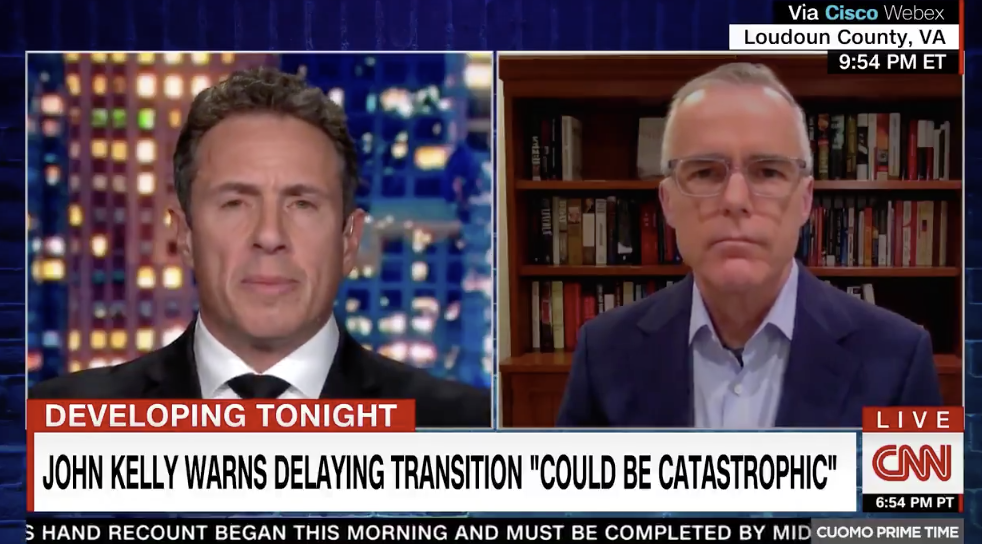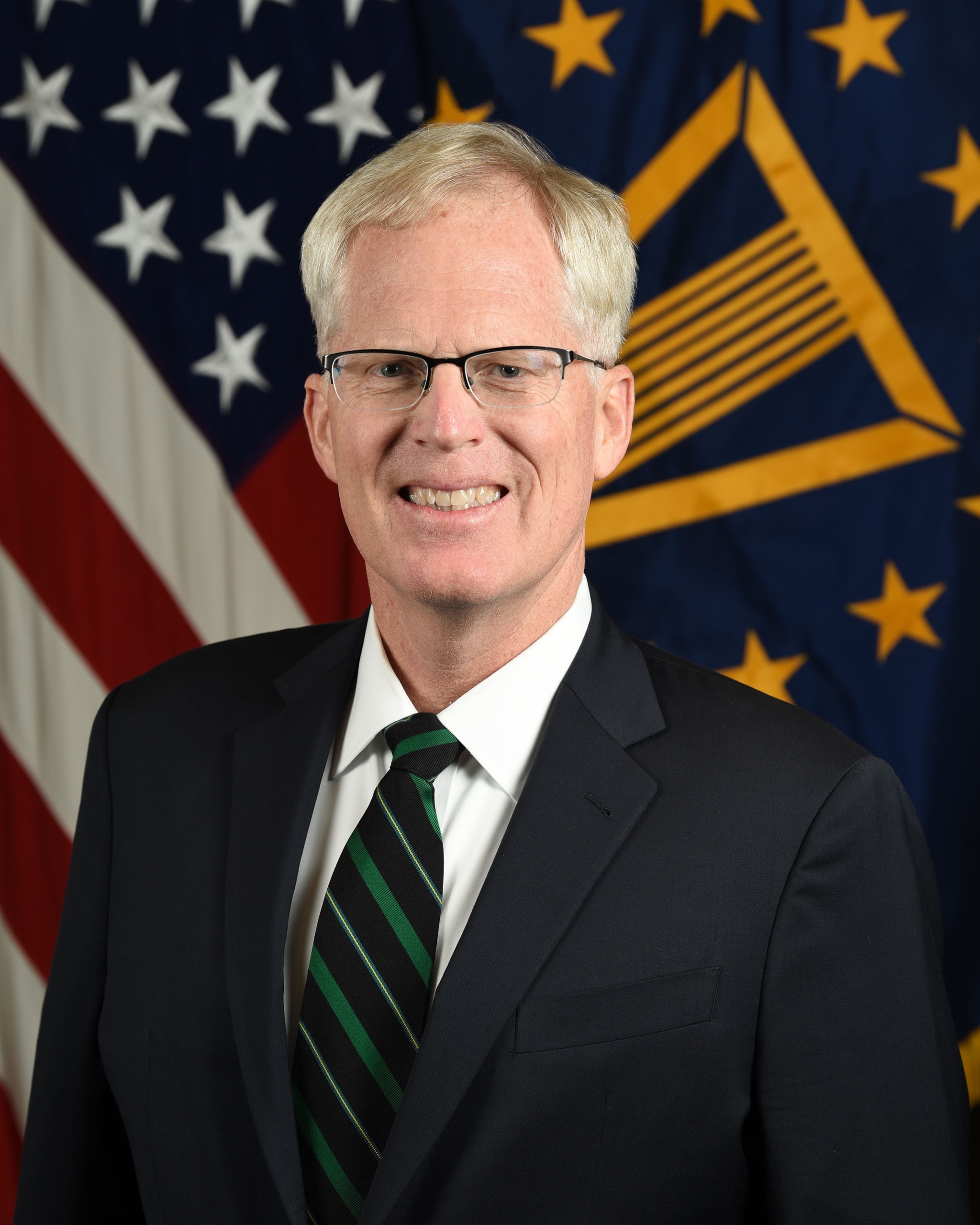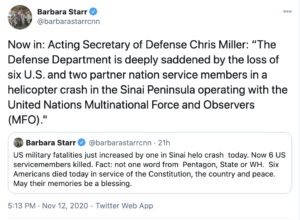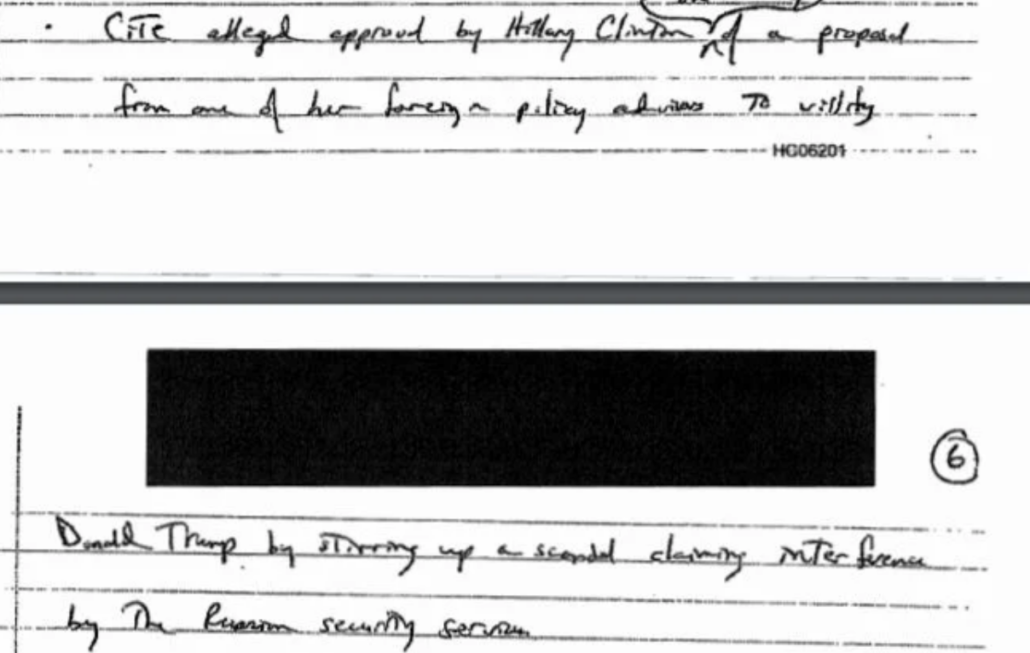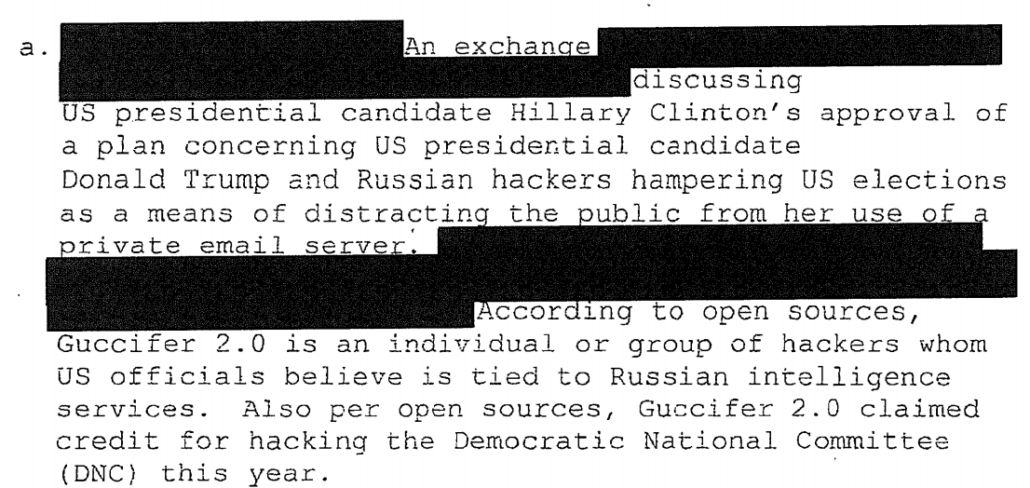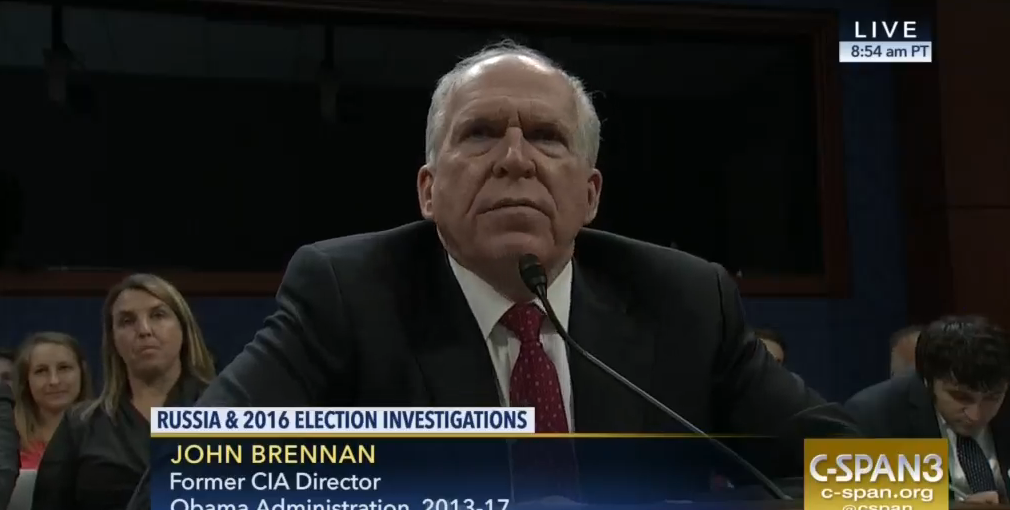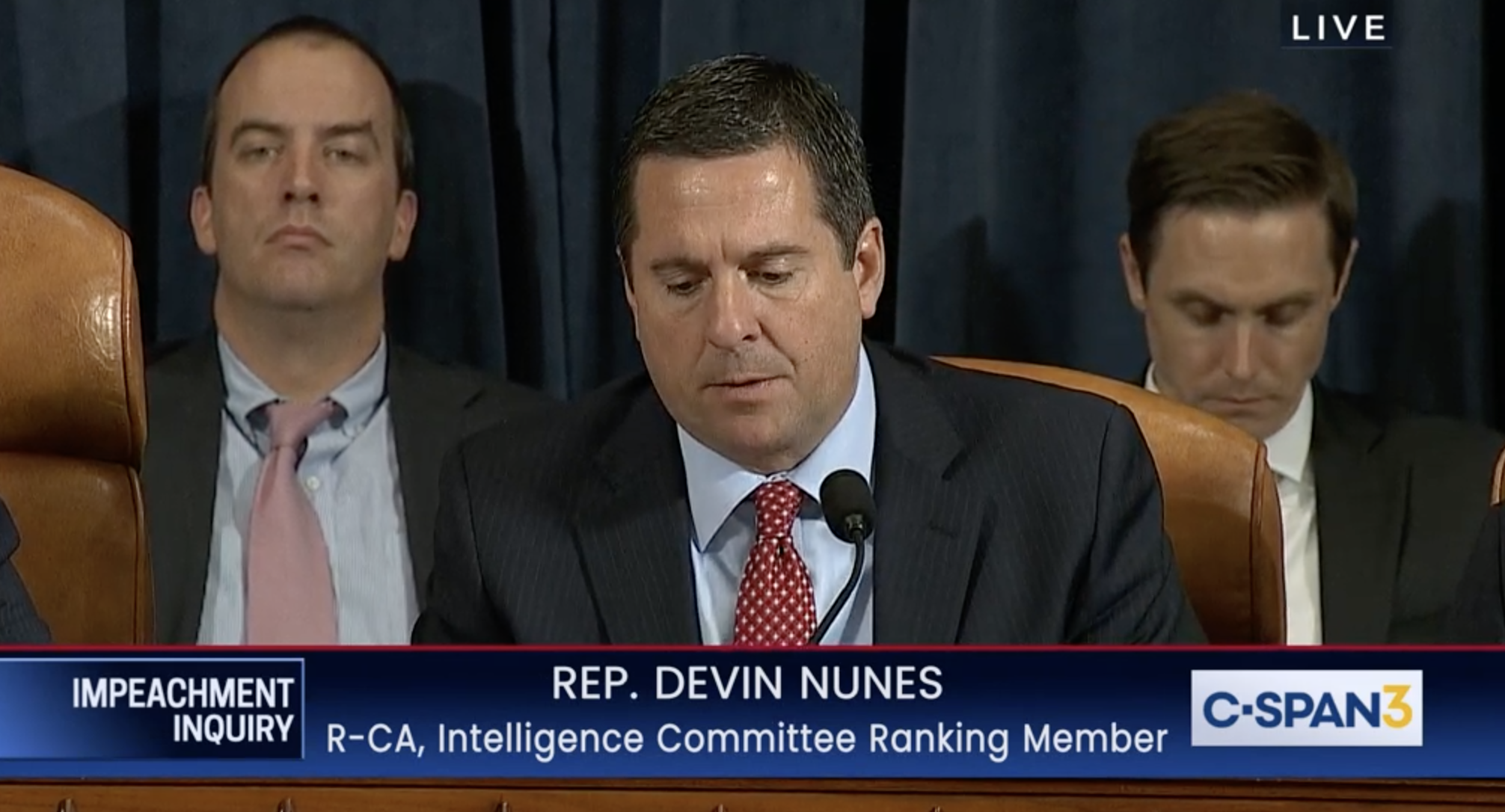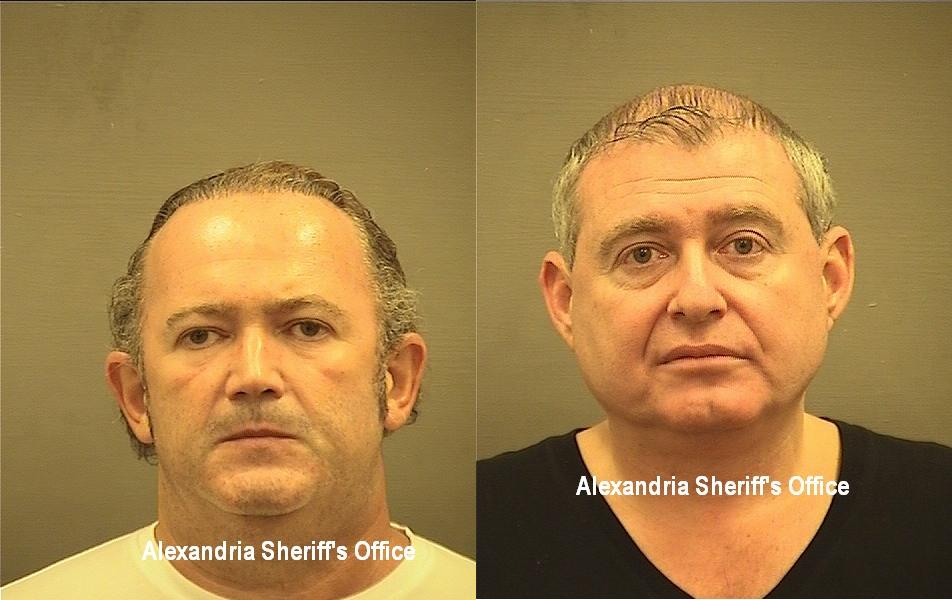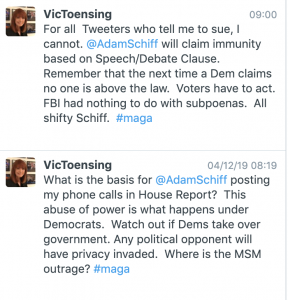As I noted, I spent much of the last month wading through the DOJ IG Report on Carter Page. Back when the IG Report came out, a bunch of people — largely Devin Nunes flunkies — declared, incorrectly and apparently without close review, that the IG Report shows that Devin Nunes was right and Adam Schiff was wrong in their memos from 2018.
The reality is that both were talking past each other, with Nunes trying to make the Steele dossier stand in for and discredit the entire investigation, and Schiff trying to point out that the Steele dossier did not predicate the entire Russia investigation. Nunes made dishonest claims about the Ohrs and Comey’s briefing of the Steele dossier to Trump. Schiff wrongly defended the FBI’s treatment of the September 23, 2016 Michael Isikoff story and overstated the known reliability of the dossier at the time of the memo, to which additional details were added by the IG Report.
Schiff overstates both the predicted and actual efficacy of the FISA collection, which is something it’d be nice to see both parties return to. Though it has long been evident that the FBI and the IC generally often continues surveillance (and surveillance programs) past their point of usefulness, the Intelligence Committees do a piss poor job of challenging such collection.
Before I compare the two, though, consider that both memos came before almost a year of parallel investigations (one conducted by House Republicans, another conducted by the DOJ IG) into the process. Even Nunes was not aware when he wrote his memo of some of the problems identified in the IG Report. I say that with great confidence, not least because I spoke with a Republican who had read the FISA application closely months after the Nunes memo was written who told me there was so much else in Carter Page’s FISA application that approval of the application was not a close call even with concerns about the dossier; the person changed his opinion after that time. In other words, when both parties released a memo about the Carter Page application in early 2018, neither side knew of some of the problems revealed in the IG Report. That’s actually evident from the things Nunes does not complain about in his memo (though he may remain silent about Page’s past relationship with CIA for classification reasons), and it means some of Schiff’s assurances about the dossier have been proven inaccurate since.
This post will conduct a paragraph-by-paragraph assessment of the letters that uses the IG Report, with one key exception, as arbiter of accuracy. The exception is DOJ IG’s conclusions on (but not facts presented about) Bruce Ohr, as that is one area where DOJ IG can be shown to misrepresent the record.
Nunes Memo
¶1-4: The introductory paragraphs of the Nunes memo lays out when FBI obtained FISA orders on Page and who approved them. These details are true, though uncontroversial. From there, Nunes adopts an outline of allegations that are either less sound or inaccurate:
¶5 (marked as 1):
“The dossier was essential:”
The IG Report said the FBI lawyer said ” the Steele reporting in September ‘pushed it over’ the line in terms of establishing probable cause,” and generally the IG Report shows that FBI would not have initiated the FISA process without the dossier, though by the time the application was approved FBI had collected more damning information on Page.
The IG Report describes five things substantiated probable cause against Page:
- Russia’s effort to influence the election
- The Papadopoulos report
- Page’s past history with Russia, including his Gazprom dealings, his serial recruitment by Russian intelligence officers, his comments about what he had told the FBI
- The Steele allegations
- His enthusiasm about being offered a “blank check” to start a pro-Russian think tank on his July trip to Russia
“Steele was a longtime FBI source:” Steele had been known to Bruce Ohr and Andrew McCabe via mutual interest in combatting organized crime since the 2000s. Ohr first introduced Steele to an FBI handler in 2010. He was formally opened as a CHS in 2013, though the two sides disagreed about the terms of that relationship.
Steele was paid over $160K, to obtain derogatory research: True, but not part of the IG Report. The Nunes memo doesn’t note that Steele was paid $95,000 by the FBI, none of it for dossier-related work.
¶ 6, 7 (marked as 1a and 1b): “Neither the initial applications nor the renewals disclose the role of the DNC, Clinton campaign, or any party/campaign in funding Steele’s efforts, even though the political origins of the Steele dossier were then known to senior DOJ and FBI officials:” The footnote disclosing this did not name any Democrat, but it wouldn’t have in any case. It did say that,
[Steele], who now owns a foreign business/financial intelligence firm, was approached by an identified U.S. person, who indicated to [Steele] that a U.S.-based law firm had hired the identified U.S. person to conduct research regarding Candidate #l’s ties to Russia (the identified U.S. person and [Steele] have a long-standing business relationship). The identified U.S. person hired [Steele] to conduct this research. The identified U.S. person never advised [Steele] as to the motivation behind the research into Candidate #l’s ties to Russia. The FBI speculates that the identified U.S. person was likely looking for information that could be used to discredit Candidate # 1 ‘s campaign.
The political origins of the dossier were suspected by senior FBI and DOJ officials before the first application. After that, they had far more specific knowledge of it, thanks largely to Bruce Ohr. The FBI did not disclose its enhanced understanding of the nature of the project in reauthorizations, though some of the people involved believed the initial footnote remained adequate.
“The FBI had separately authorized payment to Steele for the same information.” It wasn’t the same information. FBI authorized Steele to be paid if he completed taskings focused on the subjects of the investigation, but they offered that in the (false) expectation he’d offer them information exclusively. He was not, ultimately, paid for this.
¶8 (marked as 2): “The Carter Page FISA application also cited extensively a September 23, 2016, Yahoo News article by Michael Isikoff … This article does not corroborate the Steele dossier because it is derived from information leaked by Steele himself.”
This entirely misstates the point of the Yahoo inclusion, which was to include Page’s denials.
Evans told the OIG that 01 included the reference to the September 23 Yahoo News article in the FISA application solely because it was favorable to Carter Page and not as corroboration for the Steele reporting in the application. According to Evans, the application’s treatment of the article was favorable to Page in three respects: (1) the application described statements in the article that the campaign distanced itself from Page and minimized his role as an advisor; (2) the application stated that Page denied the allegations in the news article in a letter to the Director; and (3) as described below, the application made clear that the people who financed Steele’s reporting were likely the same source for the information in the article.
While it is true that the FISA application did not attribute the quote to Steele (not even after FBI learned he had been the source from Bruce Ohr), the application did attribute it to Glenn Simpson.
Given that the information contained in the September 23rd News Article generally matches the information about Page that [Steele] discovered during his/her research, the FBI assesses that [Steele’s] business associate or the law firm that hired the business associate likely provided this information to the press.
¶9, 10 (marked as 2a and 2b): “Steele was suspended and then terminated as an FBI source for what the FBI defines as the most serious of violations–an unauthorized disclosure to the media of his relationship with the FBI. … Steele should have been terminated for his previous undisclosed contacts with Yahoo.”
This is correct, insofar as Steele was closed for cause because he disclosed that he had shared information with the FBI, which amounted to being a control problem.
Strzok told the OIG that the FBI closed Steele “because he was a control problem. We did not close him because we thought he was [a] fabricator.” According to Strzok, Steele’s decisions to discuss his reporting with the media and to disclose his relationship with the FBI were “horrible and it hurt what we were doing, and no question, he shouldn’t have done it.”
But there are more serious violations, such as breaking the law.
However, a CHS must be closed for cause “if t here is grievous action by the CHS or a discovery of previously unknown facts or circumstances that make the individual unsuitable for use as a CHS.”97 Reasons that justify closing a CHS for cause include commission of unauthorized illegal activity, unwillingness to follow instructions, unreliability, or serious control problems. 98
Also, Steele’s decision to share the information, while utterly stupid from a HUMINT standpoint, was not actually a violation of any warning the FBI had given him, since he disclosed information he had collected for someone else.
Steele’s handling agent said that Steele should have been closed for cause because of the attention he was attracting for himself, but he recognized that Steele was not leaking information he had collected for the FBI (and the IG Report didn’t find any orders that he not speak to the press, either).
Handling Agent 1 told us that he understood why Steele would believe in September 2016 that he did not have an obligation to discuss his press contacts with him given that: (1) Steele’s work resulted from a private client engagement; and (2) Handling Agent 1 told Steele on July 5 that he was not collecting his election reporting on behalf of the FBI. However, Handling Agent 1 ‘s view was that while it was obvious that Fusion GPS would want to publicize Steele’s election information, it was not apparent that Steele would be conducting press briefings and otherwise interjecting himself into the media spotlight. Handling Agent 1 told us that he would have recommended that Steele be closed in September 2016 if he had known about the attention that Steele was attracting to himself. According to Handling Agent 1, Steele should have had the foresight to recognize this fact and the professionalism to afford Handling Agent 1 an opportunity to assess the situation. However, we are unaware of any FBI admonishments that Steele violated by speaking to third parties, including the press, about work that he had done solely for his firm’s clients and where he made no mention of his relationship with the FBI.
[snip]
According to Handling Agent 1, while Steele appeared to follow the directions of Fusion GPS, he did not treat his other client – the FBI – fairly. According to Handling Agent 1, if Steele “had been straight with the FBI,” he would not have been closed as a CHS.
¶11 (marked as 3): Before and after Steele was terminated as a source, he maintained contact with DOJ via … Bruce Ohr.
This is true, but it was part of a 10 year relationship based on sharing information about organized crime, and this information included non-dossier related information on Trump (focused on Oleg Deripaska’s double game offers to offer evidence against Paul Manafort) and other Russian (including doping) and non-Russian matters.
The IG Report makes the same kinds of errors in its portrayal of Ohr as the FISA Application does about Page, effectively arguing Ohr should be disciplined for the kind of information sharing DOJ and FBI have insisted they need to encourage since 9/11.
Ohr said, “Steele said he ‘was desperate.'”
This is true, though the IG Report shows (but then misrepresents) that Ohr specifically said this was an ideological desperation, not a political one: “but was providing reports for ideological reasons, specifically that “Russia [was] bad;”
¶12 (marked as 3a): “During this same time period, Ohr’s wife was employed by Fusion GPS to assist in the cultivation of opposition research on Trump … the Ohrs’ relationship with Steele and Fusion GPS was inexplicably concealed from the FISC.”
This is dishonest. Nellie Ohr’s last day working as a contractor for Fusion was September 24, 2016, so she was no longer employed by Fusion at the time of the first Page application or at the time when Ohr was helping FBI vet the dossier. The IG Report does not say their relationship should have been disclosed to the FISC, nor should it have been, as Nellie Ohr’s research was a separate stream from Steele’s.
¶13 (marked as 4):
“corroboration of the Steele dossier was in its ‘infancy’ at the time of the initial Page application.”
This is true, but that is not unusual in the FISA context.
Evans and other witnesses told us that the fact that the source information in the FISA application had not yet been corroborated was not unusual in the FISA context
DOJ assessed the reliability of this information, for the first application, by assessing Steele’s reliability and including information on his subsources. His past as an MI6 officer gave him more credibility than other sources might have had. All the applications misstated what Steele’s handling agent had said about the degree to which his past reporting had been corroborated.
“a source validation report … assessed Steele’s reporting as only minimally corroborated.”
The source validation that found Steele’s reporting to be minimally corroborated was done in March 2017, after the first two FISA applications and the Trump briefing.
“Yet in early January 2017, Director Comey briefed President-elect Trump on a summary of the Steel dossier, even though it was–according to his June 2017 testimony–‘salacious and unverified.'”
This is an utterly dishonest attack. As noted, the validation review referred to here took place two months after Comey briefed Trump on the dossier. And Comey briefed Trump on it largely because it was salacious, out of desire to warn Trump about what was out there.
“McCabe testified … that no surveillance warrant would have been sought from FISC without the Steele dossier.”
McCabe said something different to the IG when asked about this quote and this discrepancy remains unresolved.
McCabe told us that he did not recall his exact testimony, but that his view was that the FBI would have “absolutely” sought FISA authority on Carter Page, even without the Steele reporting, based upon Page’s historical interactions with known Russian intelligence officers and the fact that Page told known Russian intelligence officers about the FBI’s knowledge of those interactions. However, McCabe also told us that he was not privy to the discussions that took place between attorneys in FBI OGC and Case Agent 1 on the sufficiency of the evidence to establish probable cause before the Crossfire Hurricane team received Steele’s election reports. McCabe said he could not speculate as to whether the FBI would have been successful in obtaining FISA authority from the FISC without the inclusion of the Steele reporting.
Schiff Memo
¶1-4: Introductory matter, including an assertion that ODJ would have been remiss if they had not sought a FISA warrant. The IG Report showed that while there was no question about investigating Page’s ties to Russia, there was some question about the efficacy of the FISA application.
According to Evans, he raised on multiple occasions with the FBI, including with Strzok, Lisa Page, and later McCabe, whether seeking FISA authority targeting Carter Page was a good idea, even if the legal standard was met. He explained that he did not see a compelling “upside” to the FISA because Carter Page knew he was under FBI investigation (according to news reports) and was therefore not likely to say anything incriminating over the telephone or in email. On the other hand, Evans saw significant “downside” because the target of the FISA was politically sensitive and the Department would be criticized later if this FISA was ever disclosed publicly.
¶5: “Steele’s raw intelligence reporting did not inform the FBI’s decision to initiate its counterintelligence investigation in late July 2016. In fact, the FBI’s closely held investigative team only received Steele’s reporting in mid-September.”
This is true. The FBI opened the investigation on July 31 based off the Australian tip, and the Crossfire Hurricane team only got the Steele dossier information on September 19.
¶6-7:
“Multi-pronged rational for surveilling Page” There were five things the first Page application used to establish probable cause, as noted above.
“no longer with the Trump campaign” True.
“narrow use of information from Steele’s sources about Page’s specific activities … did not otherwise rely on Steele’s reporting, including any ‘salacious’ allegations about Trump” This is a bit cynical, because while the FBI did not use all the reports they had gotten from Steele (including the pee tape allegation), the Page application used the specific references to Page plus more general allegations about cooperation between Russia and Trump.
Specifically, the following aspects of Steele’s Reports 80, 94, 95, and 102 were used to support the application:
- Compromising information about Hillary Clinton had been compiled for many years, was controlled by the Kremlin, and the Kremlin had been feeding information to the Trump campaign for an extended period of time (Report 80);
- During his July 2016 trip to Moscow, Carter Page attended a secret meeting with Igor Sechin, Chairman of Rosneft and close associate of Putin, to discuss future cooperation and the lifting of Ukraine-related sanctions against Russia; and a secret meeting with Igor Divyekin, another highly placed Russian official, to discuss sharing compromising information about Clinton with the Trump campaign (Report 94);
- Page was an intermediary between Russia and the Trump campaign’s then manager (Manafort) in a “well-developed conspiracy” of cooperation, which led, with at least Page’s knowledge and agreement, to Russia’s disclosure of hacked DNC emails to Wikileaks in exchange for the Trump campaign’s agreement to sideline Russian intervention in Ukraine as a campaign issue (Report 95); 267 and
- Russia released the DNC emails to Wikileaks in an attempt to swing voters to Trump, an objective conceived and promoted by Carter Page and others (Report 102).
“interaction with Russian officials during the 2016 campaign … FBI interviewed Page in March 2016.” It is both true that Page’s actual interactions with Russian officials — including the offer of an “open checkbook” to open a pro-Russian think tank during his July 2016 trip — and his comments to the FBI in March 2016 were part of the case for probable cause.
“DOJ also disclosed” It is true DOJ disclosed Steele’s prior relationship and the details of his termination as a source — though at first they incorrectly only said he had been suspended — but they did not supplement the application with details of the Fusion project as they became known after the first application.
¶8-10: Repetition of the opening blather.
¶11-13: The investigation was started based off Australia’s tip about Papadopoulos and by the time the Crossfire Hurricane team received dossier information on September 19, they had already opened investigations against 4 Trump people, Page, Papadopoulos, Flynn, and Manafort [the other three names of which are redacted]. That’s true. Here’s what the government told FISC about the Papadopoulos tip:
In or about March 2016, George Papadopoulos [footnote omitted] and Carter Page (the target of this application) were publicly identified by Candidate #1 as part of his/her foreign policy team. Based on reporting from a friendly foreign government, which has provided reliable information in the past … the FBI believes that the Russian Government’s efforts are being coordinated with Page and perhaps other individuals associated with Candidate #l’s campaign. In or about July 2016, the above-referenced friendly foreign government provided information to a senior official within the U.S. [government] regarding efforts made by the Russian Government to influence the 2016 U.S. Presidential election. Specifically, according to this information, during a meeting in or about April 2016 between officials of the friendly foreign government and George Papadopoulos … Papadopoulos suggested that Candidate #l’s campaign had received some kind of suggestion from Russia that Russia could assist with the anonymous release of information during the campaign that would be damaging to another candidate for U.S. President (Candidate #2). It was unclear whether Papadopoulos or the Russians were referring to material acquired publicly or through other means. It was also unclear from this reporting how Candidate #l’s campaign reacted to the alleged Russian offer. Nevertheless, as discussed below, the FBI believes that election influence efforts are being coordinated between the RIS and Page, and possibly others.
Note the Schiff memo supplements what the government told FISC and what FBI knew at the time with information from Papadopoulos’ plea deal, though by October 2016, the FBI had come to learn outlines of Papadopoulos’ interactions with Mifsud via an informant.
¶14: Details about the Page applications. As corrected these claims are true. The Schiff memo doesn’t list the judges, but they are:
- September application: Rosemary Collyer, W appointee
- January application: Michael Mosman, W appointee
- April application: Anne Conway, Poppy appointee
- June application: Raymond Dearie, Reagan appointee
Note that the Schiff memo describes both electronic surveillance and physical search; the IG Report hides the latter. The physical search authorization is important because that provided FBI authorization to obtain Page’s stored communications, including emails.
¶15: FISA was not used to spy on the campaign. True, but the use of physical surveillance would permit the FBI to obtain stored communication, and it’s not public whether the specific minimization procedures adopted by FISC limited the access to emails Page sent while on the campaign.
¶16-17: Page’s connections to Russian Government and intelligence officials. To the extent this information is public, this is largely true (though it’s probably more accurate to state that one of the Russians indicted, Victor Podobnyy, attempted to recruit Page, and he talked about it with a second). We now know, however, that an earlier attempted recruitment happened with the knowledge of CIA, and there’s no allegation that Page hid his willingness to share information with Russian intelligence officers until 2017. That raises problems for claims he was secretly working with Russian spies.
¶18: Page’s suspicious activity during the 2016 campaign. To the extent this is public, it does reflect what FBI told FISC. The memo doesn’t deal with real questions about the allegations about whom Page met with in Russia. There’s still no corroboration that Page met with anyone named Divyekin (indeed, Dmitry Peskov affirmatively chose not to set up a meeting for him with the Kremlin), but the IG Report reveals that the people who brought Page to Moscow provided RUMINT that he had met with Igor Sechin. The Mueller Report concluded Page’s activities in Moscow “were not fully explained.”
¶19: Subsequent renewals. Much of this discussion is redacted, though it’s clear it provides details of Page’s December trip to Moscow, where he met with the Deputy Prime Minister again, and probably refers to Page’s meeting with the VP of Gazprombank in Singapore.
This table shows the new claims made in each FISA application described in the IG Report.
It’s not clear that Page’s denials in the HPSCI interview are as damning as Schiff makes out, as some of them amounted to denials of claims in the dossier than have not been proven. The IG Report would go on to describe other denials from Page that were provably true, denials that did not get included in reauthorization applications.
¶20: The Court-approved surveillance of Page allowed FBI to collect valuable information. Publicly, Michael Horowitz has suggested this is not the case. But the IG Report admits that that investigation team “did not review the entirety of the FISA [intelligence collected by] targeting Carter Page. We reviewed only those [redacted] under FISA authority that were relevant to our review.”
The Report suggests that the reality is that the first two, and possibly three, warrants were useful, as they captured Page interacting with Russia in suspicious ways, but that the fourth and maybe the third application were far less useful, in part because by that point Page knew he was being surveilled and by that point he was no longer a key player in Trump’s orbit.
¶21-22: DOJ was transparent with the Court about Steele’s sourcing. The Schiff memo accurately describes the footnote used to inform the court of the political nature of Steele’s project. It doesn’t describe that FBI didn’t amend that description as more information became known, though there is disagreement over whether more was necessary.
¶23: DOJ explained the FBI’s reasonable basis for finding Steele credible. The Schiff memo accurately describes how DOJ described Steele. But it doesn’t note that the reauthorizations did not reflect questions FBI had come to raise about the credibility of the dossier, nor does it note (and it probably wasn’t known) that the applications used language from an intelligence report rather than from Steele’s handling agent to describe the degree to which his past reporting had been corroborated, and as a result overstated that.
¶24-25: FBI properly notified FISC after it terminated Steele as a source. As a minor point, in the first reauthorization, FBI said Steele had been suspended rather than closed, when he had actually been closed. More seriously, the Schiff memo badly understates how obvious it should have been that Steele had a role in Michael Isikoff’s October 21 story (though, as noted, the FBI attributed the story to Simpson in any case).
¶26: The FBI never paid Steele for the dossier. Here, the two memos are talking past each other dishonestly. The FBI did authorize Steele to be paid for any exclusive reporting on specific taskings, but what he provided was always his work for Fusion.
¶27: DOJ appropriately provided the Court with a comprehensive explanation of Russia’s election interference, including … Papadopoulos. This is largely true. The IG Report complains that FBI didn’t include Papadopolous’ really damning admissions to informants, but the FBI correctly deemed the denials he made (and Joseph Mifsud’s denials) to be inaccurate, so had they been included they would have been included to substantiate deceit.
¶28: DOJ made proper use of news coverage. The unredacted claims are all true (though don’t account for FBI’s failures to identify Isikoff’s article as coming from Steele).
¶29-30: The Majority’s reference to Bruce Ohr is misleading.
This passage states that Ohr’s meeting with the Crossfire Hurricane team happened after the FISA application, which is true, but it doesn’t mention a meeting had with Andrew McCabe (not Crossfire Hurricane) days before the FISA application. The McCabe meeting included reporting from Steele (whom Ohr had spoken to the previous day) and Simpson; I argue, however, that the precipitating reason for the meeting had to do with Oleg Deripaska, which the IG Report inaccurately treats as synonymous with the Steele dossier (though it’s problematic for other reasons).
Also, the Schiff memo speaks of “debriefs” without describing the multiple meetings.
The Schiff memo correctly calls the Nunes memo on insinuating that because Ohr worked with Sally Yates and Rod Rosenstein that meant there was a conspiracy; in fact, the IG Report argues he should be disciplined because he didn’t provide them enough notice of what he was doing.
The evidence in the IG Report backs Schiff’s conclusion — that Ohr’s contacts with the Crossfire Hurricane team amounted to debriefing about Steele’s project — more than it backs its own.
¶31: Strzok and Page’s text messages are irrelevant to the FISA application. That is true. The IG Report found,
As part of this review, in order to determine whether there was any bias in the investigative activities for Crossfire Hurricane that we reviewed, we asked agents and analysts assigned to the case about the roles Strzok and Page played in the Crossfire Hurricane investigation and their level of involvement in decision making. With respect to Strzok, these witnesses told us that while he approved the team’s investigative decisions during the time he was in the supervisory chain of command for the investigation, he did not unilaterally make any decisions or override any proposed investigative steps. Priestap, in addition to telling us that it was his (Priestap’s) decision to initiate the investigation, told us that to his knowledge, Strzok was not the primary or sole decision maker on any investigative step in Crossfire Hurricane. Further, as described above, in January 2017, the Crossfire Hurricane cases were divided between two operational branches within CD, and Strzok no longer supervised the Carter Page investigation, which was transferred to Operations Branch II, CD-1, under the supervision of then DAD Boone. In this report, we describe those occasions when Strzok was involved in investigative decisions.
With respect to Lisa Page, witnesses told us that she did not work with the team on a regular basis or make any decisions that impacted the investigation.


